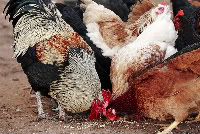Bifurcation of Resources, Renewable Energy, and the Chickens Coming Home to Roost


His point – one that I’ve been asserting for a decade now, is that we in the US are experiencing a bifurcation – a splitting – of the haves and the have-nots. Of course, this theme – the growing disparity between rich and poor – has been a subject of conversation since the Karl Marx and the dawn of the Industrial Revolution. If I’m not mistaken, Marx suggested that this is an unavoidable byproduct of capitalism. Whether or not that’s true, here we are, 150 years later, with elaborate charts to show that the rich factually have gotten richer while the poor got poorer.
My point is that the last decade – and the current economic crisis in particular — has brought this to a climax. In the last couple of years, for instance, there are about 30 million jobs that have suffered almost no recession or cutback at all – those in which professionals supply high value-added intellectual capital. At the same time, all other jobs (many times the number of the former) are suffering severe setbacks.
I saw this coming simply as a matter of the chickens coming home to roost. I.e., we’re reaping the harvest that we’ve planted in these recent decades. In a few short years, virtually every factor that made America the world’s post-War superpower has disappeared. Now, instead of a world rushing to buy our products, customers here and abroad can get what they want from vendors in 180+ countries around the world. Today, we’ve replaced our previous world-class levels of citizenship with declining standards in education, morals, work-ethic, participation in civic processes, and personal frugality. Presently, our old federal deficits – perhaps scary in their days – have been replaced with levels of bloat and waste never before dreamed of.
So let’s go back to that bifurcation. Are freshmen still admitted to Harvard? Are there still great job opportunities for your kids and mine? Sure. But the demand for these goodies has been joined by an order of magnitude more people than had access to them a few years ago, meaning that fewer of them are available on a per-capita basis. And the people with whom we’re competing for these positions are fighters. Their families have the strong values, and their countries have the policies in place – that make these kids fierce rivals.
Every once in a while, I do a number of quick sanity checks on this principle. Here’s one: I graduated without 400 others from Trinity College in Hartford, CT in 1977. I could no more get into Trinity right now with the SATs and GPA I had then than I could fly to the moon on a surfboard. So we will still have a small number of kids coming out of Trinity – and far more selective schools – each year. But because entrance is so much more competitive, fewer people on a percentage basis have access to education at small liberal arts colleges.
There are many reasons to be alarmed about this – but the one that makes it relevant to this blog is role is plays in our migration to clean energy. Few people seem to notice that the US is taking a backseat to essentially the entire rest of the world in terms of renewables. We have no federal renewable portfolio standard (RPS) – and it’s likely we never will. Very few young people even know what this is – and, of the few who understand the concept, I have to wonder how many care. More of them every year are sheep, blindly headed off to the roles they’ll be playing as burger-flippers and organge-stackers, as servants to the nations elite few. That’s not what we need in terms of an alert and angry population, vigorously demanding good, honest, clean government from our elected officials.

Excellent observations, Craig!
Two things I’ll add here…
a) The unprecedented swell in prosperity this nation enjoyed in the 50’s and 60′ and into the 70’s was not only the result of the fact that we were the only intact major industrial power after WWII – it was also largely the result of the masses of men who came back and went to college on the GI Bill, and the substantial grants for higher education that were available in that period, as well as the growing emphasis (and funding) of primary education. In other words, a well educated population is a prosperous population, as so many growing european powers discovered when they instituted free university for all citizens. Privatized education for profit equals public ignorance and servitude.
b) Plutarch said, “An imbalance between rich and poor is the oldest and most fatal ailment of all republics.” We would do well to heed his words.